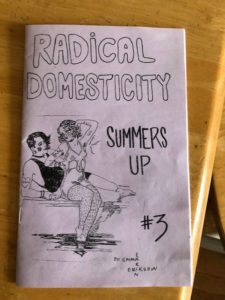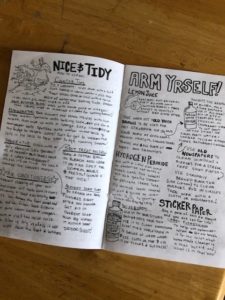Academia operates according to a set of hidden rules which uphold unexamined assumptions of academic power. One of these rules can be seen in the standardized and predictable structure of the academic thesis. The hidden power of standardization is its capacity to create a value hierarchy – a way of discerning good from bad, useful from useless. Nick Sousanis (2015) examines adherence to the academic standard of linear text as a “flatness” which contributes to the “narrowing of sight and a contraction of possibilities.” Rethinking the form of the thesis may create new avenues to tell stories differently and to transform academic thought into a wider dialogue with society.
I had a lot of questions while reading “Raised on TV: A Queer Teen’s Guide to Syndicated Personalities”. First of all, who is this written for, and why? Further, given the content of the paper (queer personalities) was it a missed opportunity not to queer the form of the paper as well as the content? Queer theory is a form of critical theory within the academy – one that functions as a praxis of resistance against widely upheld knowledge and norms. Would it be safe to say that one form of praxis could be to overturn the standardized format of the academic thesis? That is, to reimagine the identity of the academic paper outside of the normative standards which have been placed upon it?
What would ‘queering’ the academic format look and what purpose would it serve? Perhaps it would be a playful restructuring of the essay to mimic the flow of a TV show. Or maybe it could incorporate audio and visual to corroborate the content which is describing TV. Maybe it could have eschewed the typed, narrative linear format altogether and be written as a zine, combining handwritten text, images, drawings, sketches and uncensored thoughts.
What if a thesis looked like this?


Queering the form as well as the content can serve to remove academic inquiry from being an elitist and inaccessible form of knowledge. By enforcing play, personality and difference we have an opportunity to invite a wider array of thinkers and perhaps transform academic impact into real social impact too.
****
References:
- Eriksson, Emma Karin. “Summer’s Up.” Radical Domesticity (3), 2014.
- Sousanis, Nick. “Behind the Scenes of a Dissertation in Comics Form.” Digital Humanities, vol. 9, no. 4, 2015, http://www.digitalhumanities.org/dhq/vol/9/4/000234/000234.html.



